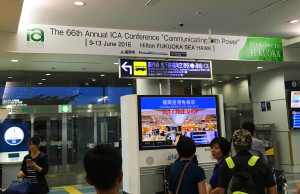 I’ve gone and done something I always wanted to do: write an ethnography of a conference; to be precise, one of the 2016 ICA conference in Fukuoka, Japan. Now, straight away, the proviso I’d make is that I’ve written one that is quite short and modest (UPDATE: and certainly it doesn’t merit the title of ‘ethnography’, as one rightly commented already in Twitter, if tongue-in-cheek). The piece is for the Counterparts section of Mediapolis, which is essentially just supposed to be a ~1300 word conference report. It’s just that I made my life difficult, perhaps, and insisted on writing it in this vignette-y way.
I’ve gone and done something I always wanted to do: write an ethnography of a conference; to be precise, one of the 2016 ICA conference in Fukuoka, Japan. Now, straight away, the proviso I’d make is that I’ve written one that is quite short and modest (UPDATE: and certainly it doesn’t merit the title of ‘ethnography’, as one rightly commented already in Twitter, if tongue-in-cheek). The piece is for the Counterparts section of Mediapolis, which is essentially just supposed to be a ~1300 word conference report. It’s just that I made my life difficult, perhaps, and insisted on writing it in this vignette-y way.
Since I knew in advance I was going to write it, though, it did sometimes make for a kind of alternate reality conference experience. I could be listening into the most mundane conversation, on the periphery, and thinking, well that’s sort of interesting. Or I could be outright bored, waiting for one thing or another, and in the deep mire of that boredom realise that I find something rather curious about it (I guess the best example of this is my tortuous wait in a lunch buffet line, my starting vignette in the piece).
More than anything, though, writing this just made me realise how much more deeply one could analyse these sorts of events. Many do so already. For example, Gabriella Coleman has published great ethnographic work on hacker conferences (opens a PDF – I must tip my hat to Giancarlo Sandoval for recently reminding me of this work). Indeed, the editorial board member who refereed and then edited the piece, Floris Paalman, did a wonderful job of pointing out all sorts of potentially interesting emergent themes, especially related to thinking about the spatial politics of the conference. While it’s too bad the length – and time available – prevented me from really exploring those themes, I hope that there are still some points which are recognisable and interesting to the academic conference goer, whether frequent or sporadic, ICA or otherwise.
0 Comments Leave a comment